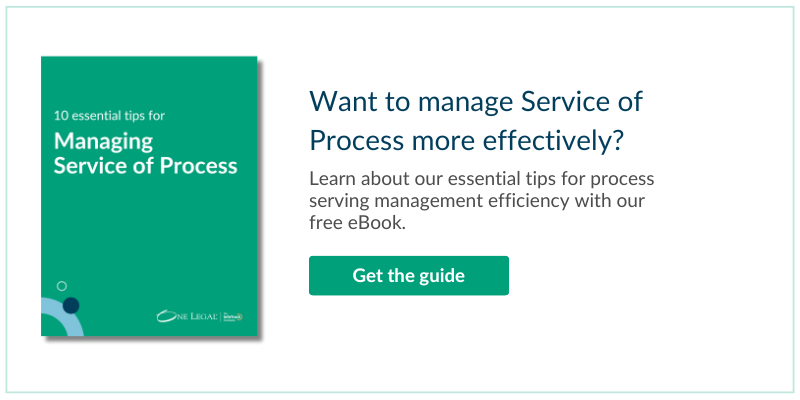The rules for service of process in the United States are governed by the Federal Rules of Civil Procedure (FRCP).
These rules outline the procedures for serving legal documents, such as complaints, summonses, subpoenas, and other court papers, on parties involved in a federal lawsuit.
Please note that rules may change or be updated over time, so it is essential to consult the most recent version of the FRCP for the latest information.
In this article, we’re tackling the federal rules for service of process, which is primarily concerned with Rule 4 of the FRCP.
Proper service of process is essential for upholding due process and allowing parties to exercise their right to be heard in court. This post provides a glimpse into the rules of service of process within the federal court system.
Let’s get started and take a look at the federal rules of civil procedure for service of process.
What are the Federal Rules of Civil Procedure?
The Federal Rules of Civil Procedure (FRCP) are a set of rules that govern civil procedure in United States district courts.
These rules were initially adopted by the Supreme Court of the United States in 1938 and have been amended several times since then to reflect changes in legal practice and procedure.
The FRCP cover a wide range of procedural matters in civil cases, including:
- Pleadings: The rules outline the requirements for complaints, answers, and other initial documents filed by parties to a lawsuit.
- Discovery: The rules govern the exchange of information between parties, including depositions, interrogatories, requests for documents, and other forms of discovery.
- Motions: The rules provide procedures for filing motions, such as motions to dismiss, motions for summary judgment, and other pre-trial and post-trial motions.
- Trials: The rules establish procedures for conducting trials, including the presentation of evidence, examination of witnesses, and jury instructions.
- Judgments: The rules govern the entry of judgments and orders by the court, including procedures for motions for judgment as a matter of law and motions for new trials.
- Appeals: The rules provide procedures for appealing decisions of the district court to the appellate courts.
The FRCP are designed to ensure fair and efficient resolution of civil disputes in federal courts and to promote consistency and uniformity in civil litigation across the United States.
While the FRCP apply specifically to proceedings in federal district courts, many state courts have adopted similar rules for their own civil proceedings, such as California’s Rules of the Court.
FCRP Rule 4
Rule 4 of the FRCP deals specifically with the issuance and service of a summons. It sets forth the requirements for the contents of the summons and the manner in which it must be served on the defendant.
Rule 4 is an essential rule that outlines the requirements and rules for federal service of process and serving parties involved in a federal case.
Below is an overview of the key components of Rule 4:
Rule 4(a): Summons
This section addresses the issuance of the summons by the court clerk upon the plaintiff’s request. The summons is a formal notice to the defendant that a lawsuit has been filed against them and that they must respond to the complaint within a specified time.
Rule 4(b): Time limit for service
Rule 4(b) sets the time limit for serving the summons and complaint on the defendant after the complaint is filed. In general, service must be completed within 90 days from the date the complaint was filed. However, the court may extend this period upon a showing of good cause.
Rule 4(c): How to serve individuals
This section describes the various methods of serving individuals. It includes personal service (by delivering a copy of the summons and complaint to the individual in person), leaving a copy at the person’s dwelling with someone of suitable age and discretion who resides there, or serving an agent authorized to accept service.
Rule 4(d): Waiving service
Rule 4(d) allows the plaintiff to request that the defendant waive formal service of the summons and complaint. If the defendant agrees to waive service, they may be given more time to respond to the complaint. If the defendant does not waive service, they are responsible for the costs of service. This is particularly useful in cases where it is impossible to serve someone, and in some cases, a substitute service of process method can be used by firms.
Rule 4(e): Serving an Individual in a foreign country
This section addresses the process for serving individuals located in foreign countries. It outlines the use of internationally agreed-upon methods, as well as any other method allowed by the court’s applicable rules or by treaty.
Rule 4(f): Serving a corporation, partnership, or association
Rule 4(f) deals with serving corporations, partnerships, or associations, including those located in foreign countries. It describes the procedures for serving these entities, which may include serving an officer, a managing or general agent, or another agent authorized to accept service.
Rule 4(g): Serving the United States and its agencies, corporations, officers, or employees
This section outlines the procedures for serving the United States, its agencies, corporations, officers, or employees. Specific rules are provided for serving the United States and its various entities.
Rule 4(h): Serving a foreign, state, or local government
Rule 4(h) addresses the process for serving foreign, state, or local governments and their agencies, corporations, officers, or employees.
Methods of service
The FRCP allows for various methods of service, including personal service, service on an authorized agent, and service by mail or electronic means, among others.
Here are the key methods of service outlined in the FRCP:
Personal service (Rule 4(c)(1))
Personal service involves physically delivering a copy of the summons and complaint directly to the individual defendant. This can be done by a process server, a law enforcement officer, or someone appointed by the court. Personal service is the most common method and is often required for serving individuals.
Service on an authorized agent (Rule 4(h))
If an individual defendant has appointed an agent to receive service on their behalf, the agent may be served instead of the individual. Similarly, corporations, partnerships, associations, and other entities often have designated agents for service of process, and service on such an agent is sufficient.
Waiving service (Rule 4(d))
This concerns the federal rules of civil procedure for waiver of service.
The plaintiff may request that the defendant waive formal service of the summons and complaint. If the defendant agrees to waive service, they sign a waiver form, and the case can proceed without the need for formal personal service.
However, if the defendant does not waive service, they are responsible for the costs of service.
Service by mail (Rule 4(e)(1))
Service by mail involves sending a copy of the summons and complaint through the mail to the defendant’s last known address. This method is allowed for serving individuals within the United States and its territories, as long as it is not prohibited by the court’s rules. Importantly, this method does not apply to service on individuals in foreign countries.
Service in a foreign country (Rule 4(f))
When serving individuals or entities located in foreign countries, the FRCP allows for service in accordance with internationally agreed-upon methods or other methods authorized by the court’s rules or by treaty. The Hague Service Convention is one commonly used international agreement for service of process between member countries.
Service on the United States, its agencies, corporations, officers, or employees (Rule 4(g))
Serving the United States or its agencies, corporations, officers, or employees involves specific procedures outlined in Rule 4(g). This includes service on the U.S. Attorney General or the United States Attorney for the district where the action is brought.
Service on individuals
Generally, service on an individual is accomplished by delivering a copy of the summons and complaint directly to the person being served. This can be done by a process server, a law enforcement officer, or someone appointed by the court.
Service on corporations and entities
Service on corporations and other legal entities can often be achieved by serving the designated agent for service of process or other authorized representatives of the entity.
Service by mail
Service of process can be achieved by mailing the summons and complaint to the defendant’s last known address, provided that this method is permitted by the specific rules of the court.
Time limits
The FRCP establishes specific time limits within which service of process must be completed after filing the lawsuit. Failure to effect timely service may result in the case being dismissed.
These time limits are crucial for ensuring that the litigation process progresses efficiently and that all parties have sufficient time to fulfill their obligations. Here are some of the key time limits under the FRCP:
Time to respond to complaint (Rule 12)
After being served with a complaint, the defendant typically has 21 days to respond by filing an answer or a motion under Rule 12. However, the time frame can vary depending on factors such as the method of service and whether the defendant has waived service.
Time for service of process (Rule 4(m))
Rule 4(m) sets the time limit for serving the summons and complaint on the defendant after the complaint is filed. In general, service must be completed within 90 days from the date the complaint was filed. However, the court may extend this period upon a showing of good cause.
Time for serving an answer to a crossclaim or third-party complaint (Rule 14)
A defendant who is served with a crossclaim or a third-party complaint typically has 21 days to respond by filing an answer.
Time for serving a reply (Rule 12(a)(4))
A plaintiff, in response to a counterclaim, must file a reply within 21 days after being served with the counterclaim.
Time for initial pretrial conference (Rule 16)
Under Rule 16, the court must issue a scheduling order that sets the time for the initial pretrial conference. This conference must be held as soon as practicable and typically within 90 days after the defendant is served or within 120 days after the complaint is filed, whichever is earlier.
Time for discovery (Rule 26)
The FRCP does not specify a specific time limit for the duration of the discovery period. However, Rule 26(f) requires the parties to meet and confer early in the case to create a discovery plan, which should address the timing and scope of discovery.
Time for amending pleadings (Rule 15)
Generally, a party may amend its pleadings within 21 days after serving them or within 21 days after service of a responsive pleading or motion. After this period, a party may seek court permission to amend the pleadings.
Proof of service
Once service has been completed, the person who served the documents must provide proof of service to the court. This proof is usually in the form of an affidavit or a certificate of service.
Typically, proof of service can be established through various methods, such as:
- Affidavit of service: A written statement or sworn affidavit signed by the person who served the documents, providing details of when, where, and how service was accomplished.
- Certificate of service: A document completed by the person who served the documents, attesting to the date, time, and manner of service.
- Return of service: This is a form or document completed by the process server or law enforcement officer, confirming that the summons and complaint were served on the defendant.
- Notarized affidavit or declaration of service: A notarized statement from the person who served the documents, attesting to the fact of service.
- Proof of mailing (if applicable): For service by mail, a copy of the mailing receipt or other proof of mailing may be provided to show that the documents were sent to the defendant’s address.
It’s crucial to remember that state laws may also have additional rules governing service of process, and these rules can vary from state to state. Therefore, it is essential to consult both the Federal Rules of Civil Procedure and the specific rules of the jurisdiction where the lawsuit is filed to ensure compliance with all requirements.
Conclusion
The federal rules for service of process are primarily governed by Rule 4 of the Federal Rules of Civil Procedure (FRCP).
These rules ensure that all parties in a federal civil lawsuit receive proper notice of the legal action against them and have a chance to respond.
Methods of service include personal service, service on authorized agents, service by mail, and service in foreign countries.
The FRCP sets a 90-day time limit for completing service of process from the date the complaint is filed.
Proper proof of service, established through methods like affidavits or certificates of service, is crucial for compliance.
Non-compliance may lead to case dismissal or court-ordered service within a specific timeframe. Legal counsel is essential for navigating these complexities.








